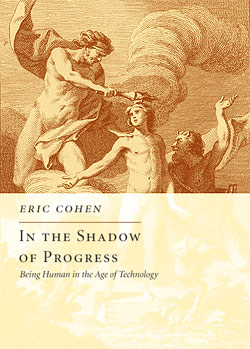We live in an age of unprecedented human mastery — over birth and death, body and mind, nature and human nature. In every realm of life, science and technology have brought remarkable advances and improvements: we are healthier, wealthier, and more comfortable than ever before. But our gratitude for the benefits of progress increasingly mixes with concern about the meaning and consequences of our newfound powers. If we can dream about a new age of genetic medicine, we can also shudder at a new age of weapons of mass destruction. As we welcome longer lives, we wonder if we will still value human life as we should.
In the Shadow of Progress: Being Human in the Age of Technology is a deep and lively reflection on the moral challenges of the technological age. Eric Cohen, a leading voice in America’s bioethics debates, offers a tour of the complex dilemmas at the intersection of science and morality, moving seamlessly from contemporary subjects like stem cells and evolution to classic texts like the Hebrew Bible and Francis Bacon’s “New Atlantis.”
Why are the wealthiest people in human history the least likely to want children? What kind of civilization will we become if we seek cures for the sick by destroying human embryos? What is lost when we relieve human sadness by altering the chemical balance of the brain, or enhance human performance by altering the biological workings of the body? In this age of scientific wonders, have we forgotten what sets human beings apart from everything else in the natural world? Can the fruits of modern science ever satisfy our deepest longings — for love, for virtue, and for transcendence?
In the end, Cohen argues, there are no easy answers. Our challenge is to live simultaneously with gratitude and fear, pride and shame, sobriety and hope, in this new age of technology.

